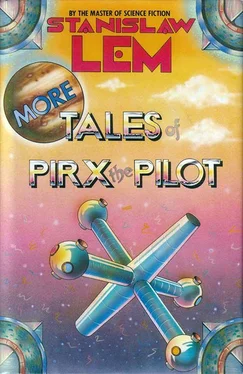I switched on the radiophone and demanded that the other ship display its navigational lights and send up flares, that it report its call numbers, name, destination, owner—all in the standard code, of course—but it kept cruising leisurely, silently along, altering neither course nor speed by so much as a fraction of a degree or a second. It now lay eighty kilometers astern.
So far, it had been situated a little to the port side; now I could see it was lapping me. The angular correction meant that the clearance would be even tighter than the one projected by the computer. Under thirty kilometers, in any case, perhaps as low as twenty. The rules sad I should have been braking, but I couldn’t. I had a necropolis of over a hundred thousand tons behind me; I would have had to unhook all those dead hulks first. But alone, without a crew? Oh, no, braking was out of the question. Friend, I told myself, what you need now is not astronautical savvy but philosophy—starting with a little fatalism and, in case the computer’s projection was high, even a dabbling in eschatology.
At exactly twenty-two kilometers, the other ship began to outstrip the Pearl. From now on the values would increase, which meant we were in the clear. All this time my eyes had been glued to the range-finder. I shifted my gaze back to the radar screen.
What I saw was not a ship but a flying island. From twenty kilometers away, it now measured about two fingers in width. The perfectly symmetrical spindle had become a disk—better, a ring!
I know what you’re probably thinking: an alien encounter. I mean, a ship measuring twenty kilometers in length…? An alien encounter. A catchy phrase, but who believes in it? My first impulse was to tail the thing. Really! I even grabbed the stick—then held back. Fat chance I’d have with all that scrap in tow. I heaved out of my seat and climbed a narrow shaft to the small, hull-mounted astrodome atop the cockpit. It was conveniently stocked with telescope and flares. I fired three in quick succession, aiming for the ship’s general radius, and tried to get a sighting in the glare. An island, yes, but still hard to locate right away. The flash blinded me for a few seconds, until my eyes adjusted to the brightness. The second flare landed wide, too far away to do any good; the third, just above it. In that immobilizing white light, I saw it.
Only a glimpse, really, lasting no more than five or she seconds, because I was using one of those exceptionally bright flares that fade very fast. But in the space of those few seconds, I saw, looking down at an angle through my night glasses, whose eighty-power lenses brought it to within a few hundred meters, an eerily but sharply illuminated mass of metal. So massive, in fact, it barely fit into my field of vision. Stars showed in the center. A sort of hollow, cast-iron, spaceborne tunnel, but—as I noticed in the last glimmerings of light—somewhat squashed, more tire-shaped than cylindrical. I could see straight through the core, even though it wasn’t on the same axis; the monster stood at an angle to my line of vision, like a slightly tipped glass of water.
There was no time for idle contemplation. I fired more flares; two failed to ignite, the third fell short, the fourth and fifth made it stand out—for the last time. Having crossed the Pearl’s tangent, it sheered off and quickly widened the gap—one hundred kilometers, two hundred, three hundred—until it was completely out of eye range.
I immediately hustled back to the control room to plot its trajectory, because afterward I intended to sound a general alarm, in all sectors, such as had never been heard. I already had visions of a cosmic chase after the alien intruder—a chase using my trajectory—although secretly I was sure it belonged to the hyperbolic swarm.
There are times when the human eye can behave like a camera lens, when a momentarily but brilliantly cast image can be not merely recalled but meticulously reconstructed as vividly as if viewed in the present. Minutes later, I could still visualize the surface of that colossus in the flare’s afterglow, its kilometers-long sides not smooth but pocked, almost lunar in texture; the way the light had spilled over its corrugated rills, bumps, and craterlike cavities—scars of its interminable wandering, dark and dead as it had entered the nebulae, from which it had emerged centuries later, dust-eaten and ravaged by the myriad bombardments of cosmic erosion. I can’t explain my certainty, but I was sure that it sheltered no living soul, that it was a billion-year-old carcass, no more alive than the civilization that gave birth to it.
With my mind still astir with such images, I computed, for the fourth, fifth and sixth time, the elements of its trajectory, and, with each punch of the key, entered the data on the recording machine. Every second was precious; by now, the ship was a mere phosphorescent green comma, a mute firefly hugging the edge of the screen on the right, receding to a distance of two, then three, then six thousand kilometers.
Then it was gone. Why did that bother me? It was dead, had no maneuvering ability, couldn’t run or hide. OK, it was flying at hyperbolic, but any ship with a high-power reactor and the target’s exact trajectory could easily outrun it.
I opened the cassette recorder to remove the tape and take it down to the radio room—and froze. The metal sprocket was empty; the tape had run out hours, maybe even days ago, and nobody had bothered to refill it. I had been entering the data on nothing. All lost. No ship, no trace, nothing.
I lunged for the screens. That goddamned baggage train! Oh, how I wanted to dump Le Mans’s treasures and take off. Where to? I wasn’t sure myself. Direction Aquarius, I think—but I couldn’t just aim for a constellation! Still? If I radioed the sector, gave the approximate speed and course data…?
It was my duty as a pilot, my first and foremost duty, if I could still do anything at all.
I took the elevator to midships, to the radio room. I foresaw everything: the call to Luna Central, requesting priority for future transmissions of the utmost urgency, which were sure to be taken by the controller on duty, not by one of their computers. Then my report about having sighted an alien craft intersecting my course at a hyperbolic velocity and conjectured to be part of a galactic swarm. When the controller asked for its trajectory, I would have to say that I had computed it but was missing the data, because, due to an oversight, the recorder’s tape cartridge had been empty. He’d then ask me to relay the fix of the pilot who was first to sight the ship. Sorry, no fix, either: the watch officer was a civil engineer. Next—provided he hadn’t begun to smell a rat—why hadn’t I instructed my radiotelegraph operator to relay the data while I was doing my computations? I’d have to tell him the truth: because the operator had been too drunk to stand watch. If he was then still in the mood to pursue this conversation, taking place across more than three hundred sixty-eight million kilometers, he would inquire why one of the pilots hadn’t filled in for the missing operator, to which I’d reply that the whole crew had been bedridden with the mumps. Whereupon, if he still harbored any doubts, he would safely conclude that I either had flipped or was myself drank. Had I tried to record the ship’s presence in any way—by photographing it in the light of the flares, for example, by transcribing the radar data on ferrotape, or at least by recording all my subsequent calls? But I had nothing, no evidence. I had been too rushed; and why bother with photographs—I recalled thinking—when Earth’s ships were bound to catch up with the target, anyway? Besides, all the recording equipment had been off.
Читать дальше












